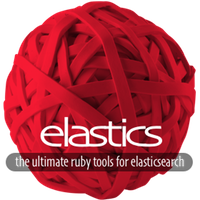
How to migrate from Flex 0.x
Elastics 1.x has changed quite a lot from Flex version 0.x but you need just to rename a few things in order to upgrade it. You should be able to do it in a couple of minutes with the help of the elastics-legacy gem and just a few search and replace. If you miss any change, Elastics will work anyway, but will emit a deprecation warning, so keep an eye on the log.
Changes
1. Gem changes
Rails Apps
You have to change gem 'flex', :require => 'flex/rails' to simply gem 'elastics-rails' in your Gemfile. Then add elastics-legacy gem to your Gemfile. It will make it work almost as it is and it will allow a smoot migration. Run a bundle install and your app should be able to start. Then it will emit the deprecation warnings for the other changes in the log.
Non Rails Apps
If you used model related functionality, you will be required to load the elastics-models gem that is now separated by the elastics-client core gem. You should require the elastics-legacy gem. It will make it work almost as it is and it will allow a smoot migration.
2. Configuration Renaming
base_uri > http_client.base_uri
http_client_options > http_client.options
raise_proc > http_client.raise_proc
logger.color > ansi
3. Special Variables
vars[:size] is not a special variable anymore, so it will not be automatically converted to the vars[:params][:size] param anymore. You must set it as a standard param: :params => {:size => size}.
Elastics will not emit any warning if you still use the old
vars[:size]variable with the intention to change thevars[:params][:size]param: it will just not set the param. If you used the<<size>>tag in any template it will work as long as a:sizevariable is set. Remember that tags can now refer to nested variables, so you could refer to thevars[:params][:size]param in any template with<<params.size>>.
4. Method Renaming
add > deep_merge! for all variables receivers
info > doc to print the self documentation (e.g. Elastics.doc, YourClass.elastics.doc (see Self Documentation))
Bulk Support
Flex.bulk(:lines => lines_bulk_string) > Elastics.post_bulk_string(:bulk_string => lines_bulk_string)
Flex.process_bulk(:collection => collection) > Elastics.post_bulk_collection(collection, options)
Flex.import_collection > Elastics.post_bulk_collection
Flex.delete_collection(collection) > Elastics.post_bulk_collection(collection, :action => "delete")
5. Modules Renaming
Flex::Loader > Elastics::Templates
Flex::Model > Elastics::ModelIndexer
Flex::RelatedModel > Elastics::ModelSyncer
6. Rake Tasks Renaming
Notice: The following rake tasks have been renamed and are not available, so please, change their name acordingly. Besides some ENV variable used for other tasks, may also have been renamed (see Rake Tasks)
flex:create_indices > elastics:index:create
flex:delete_indices > elastics:index:delete
7. flex > elastics
Search and replace in all your code 'flex' for 'elastics'. You must preserve the case so for example 'Flex' will be replaced by 'Elastics' and 'flex_indexable?' will be replaced by 'elastics_indexable?' etc.
Rename also the 'flex' dir to 'elastics' and the files 'flex.yml' and 'flex.rb' to 'elastics.yml' and 'elastics.rb'.
Additions
You may want to check the new documentation in order to take advantage of the new features of the gems. For example, you may want to add Elastics::Scopes to some of your classes, or you may want to use the new elastics-admin binary and tasks, or live-reindexing your code/index changes, or fine-tuning the configuration of the new elastics logger etc. (see Elastics Overview and Usage Overview)
